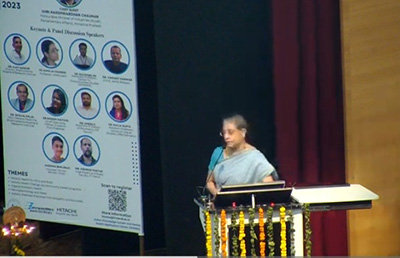Mandi- Dr. Rama Jayasundar, a highly acclaimed Professor at AIIMS, New Delhi said that stress and mental health issues have emerged as the number one health epidemic of the 21st century, surpassing other diseases in prevalence.
Sharing her expertise in clinical imaging neuroscience applications and Ayurveda at the conclave on holistic health at IIT Mandi, Dr Jayashankar shed light on the ancient system of holistic healthcare.
With many awards to her kitty, Dr. Jayasundar highlighted the paradox of modern age.
Despite the tremendous advancements in science and technology, we are still struggling to understand how to achieve and maintain good health, she said.
Surprisingly, stress and mental health issues have emerged as the number one health epidemic of the 21st century, surpassing other diseases in prevalence.
Stress, which has always been a part of human existence, now poses a greater threat to our well-being. This raises the question of whether we have become physically, physiologically, and emotionally weaker, or if we have simply lost the ability to cope with life's challenges.
She emphasized that stress significantly increases vulnerability to various diseases, becoming a major cause of many health epidemics. This revelation reinforces the need for a holistic approach to healthcare.
Dr. Jayasundar explained that holistic health considers multiple dimensions of human existence, including physical, physiological, mental, emotional, social, and even spiritual aspects.
She stressed the importance of incorporating spirituality into our understanding of health, as modern medicine often neglects this vital aspect.
To comprehend health holistically, she argued for a model that incorporates the mind and other interconnected aspects of human existence.
The selection of such a model is influenced by the worldview one adopts. The current model used in modern biology and medicine, based on the worldview of classical physics, separates the mind from the physical body. In contrast, Ayurveda offers an alternative approach.
Ayurveda, often misunderstood as solely focused on disease care, actually encompasses both health and disease.
It defines health as a complete balance of physical, physiological, mental, emotional, and social well-being, going beyond the absence of disease.
Ayurveda recognizes multiple layers of health, including individual, physical, physiological, psychological, emotional, interpersonal, and social, as well as environmental and ecological health.
The Ayurvedic model conceptualizes the human system as a seamless integration of mind, body, and soul, factoring in the interconnectedness of all aspects, she said.
It acknowledges the structural, physiological, psychological, and conscious domains, interlinked through various parameters and metrics.
Dr. Jayasundar touched upon the functional classification in Ayurveda, which considers movement, metabolism, and growth as key human functions.
These functions are characterized by the parameters Vata, Pitta, and Kapha (VPK). These parameters encompass a wide range of biophysical, chemical, physiological, and psychological characteristics that influence the overall psychophysiological functioning of an individual.
She explained how imbalances in VPK can affect mental health, causing changes in mood, emotions, and behavior.
Ayurveda employs various interventions, including physical treatments, non-pharmacological approaches like yoga and meditation, and lifestyle modifications to manage health holistically.
Dr. Jayasundar emphasized that Ayurveda's comprehensive understanding of health and disease, along with its holistic management approach, holds immense value for individuals, society, and the world at large.
She called for a broader recognition of Ayurveda by organizations like the World Health Organization, emphasizing the need for reinterpreting and redefining its concepts in light of modern scientific knowledge.
Dr. Jayasundar's enlightening speech highlighted the importance of embracing a holistic approach to healthcare by integrating Ayurveda's ancient wisdom with modern scientific advancements.




